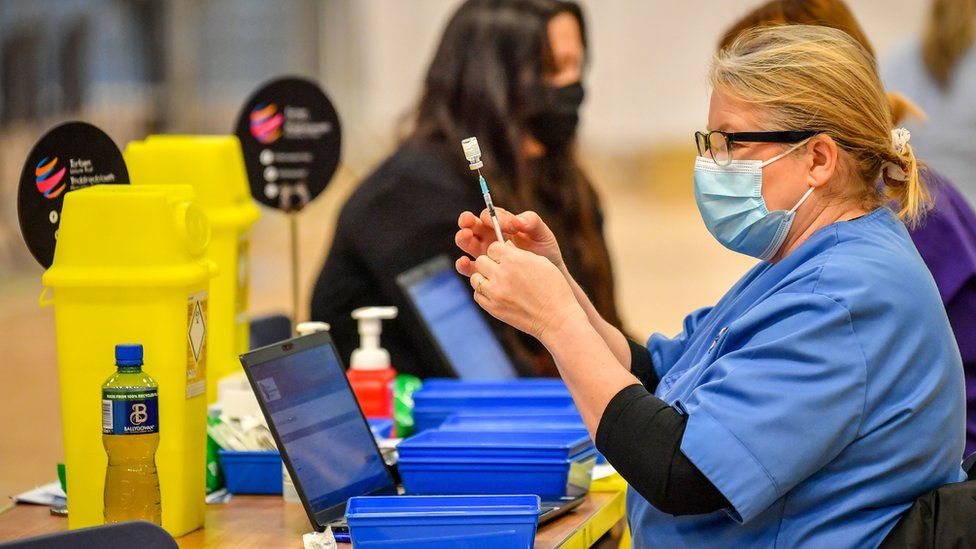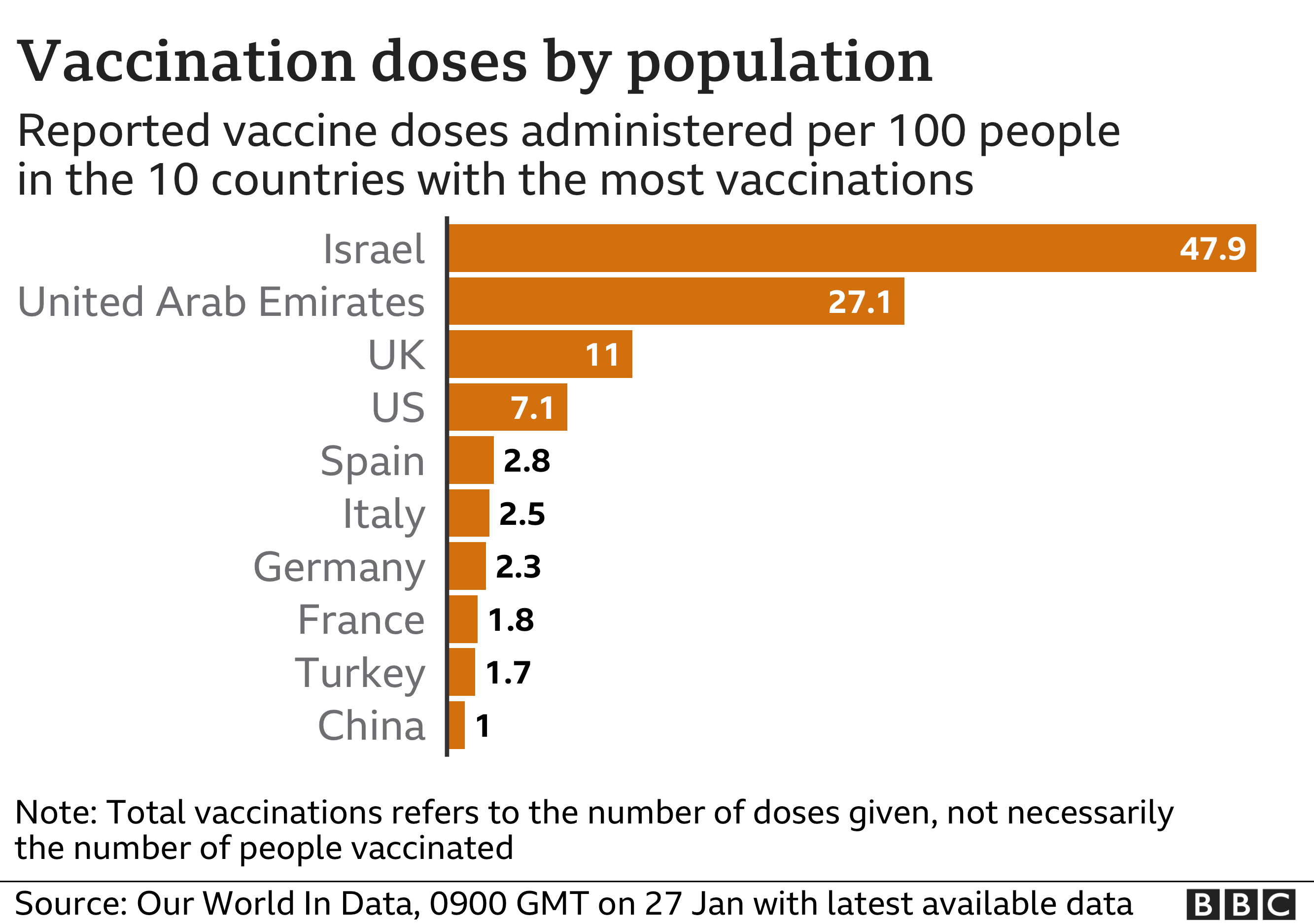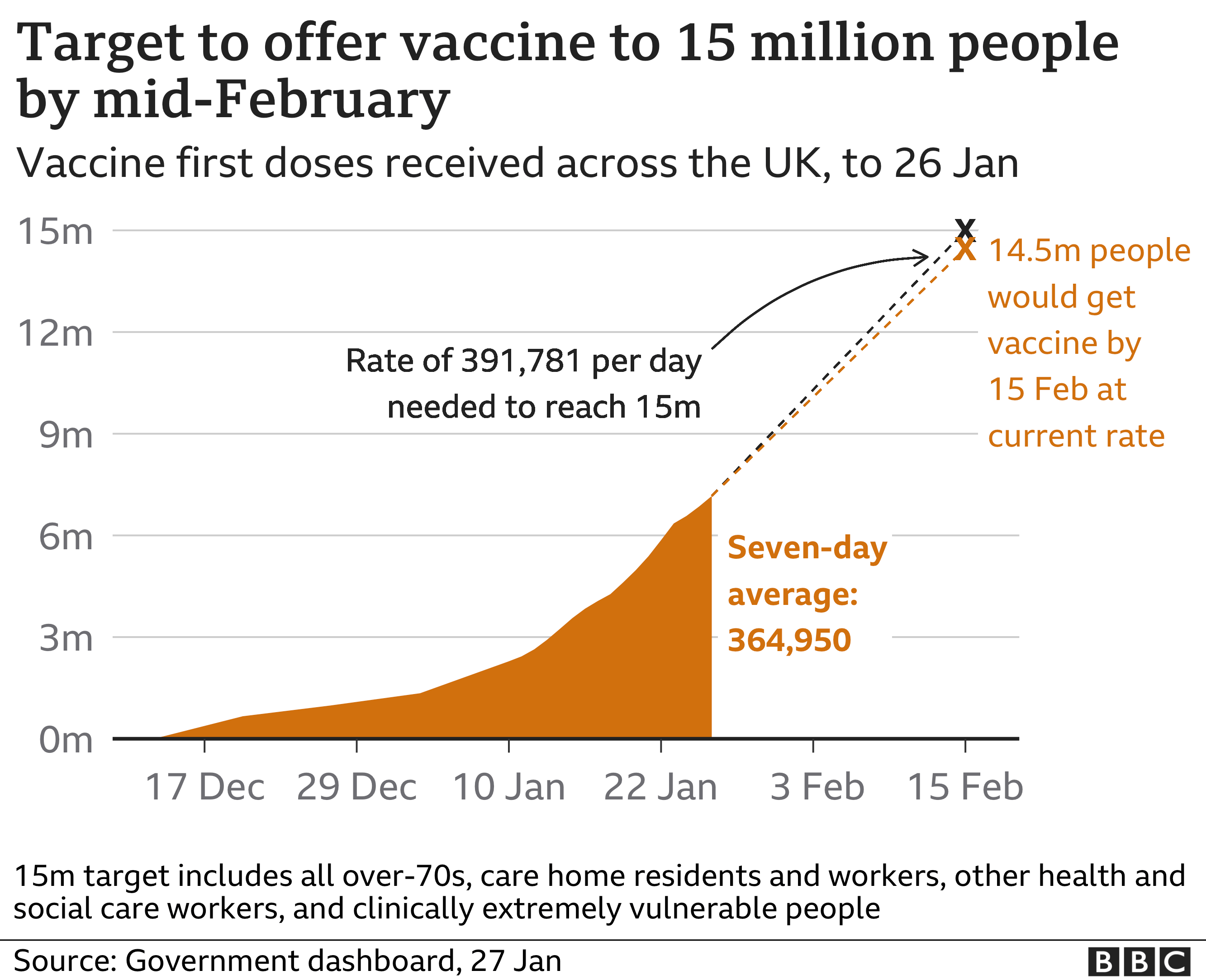
There "will be no interruption" to UK vaccine supplies, Cabinet Office minister Michael Gove has said, after the EU urged AstraZeneca to supply it with doses from UK plants.
"It is the case that the supplies that have been planned, paid for and scheduled should continue," he added.
The EU and AstraZeneca are involved in a row over vaccine supply shortages.
Sir Jeremy Farrar, a scientific adviser to the UK government, said vaccine nationalism did not serve anyone.
The EU has demanded that UK-made jabs are diverted to Europe to fulfil contractual obligations.
AstraZeneca has previously said it could deliver the EU only a fraction of the doses between January and March that it had promised, blaming production issues at European plants for a reported 50 million-dose shortfall.
However, they have both pledged to work together to resolve the crisis.
The AstraZeneca vaccine, developed with Oxford University, has not yet been approved by the EU, although this is expected on Friday.
Mr Gove said: "We must make sure that we continue with the effective acceleration of our vaccination programme. That relies on the supply schedule that has been agreed to be honoured. That's the first and most important thing.
"But secondarily I'm sure we all want to do everything possible to make sure that as many people in countries which are our friends and neighbours are vaccinated and I think we best achieve that through dialogue and co-operation and friendship," he told BBC Radio 4's Today programme.
Pressed on whether the government will allow vaccines to go to the EU, he said: "No, the critical thing is we must make sure that the schedule that has been agreed and on which our vaccination programme has been based and planned goes ahead.
"It is the case that the supplies that have been planned, paid for and scheduled should continue, absolutely. There will be no interruption to that."


Sir Jeremy, a member of the government's Scientific Advisory Group for Emergencies (Sage), said it was in the UK's "national interests" to ensure as many people in the world as possible were vaccinated.
Asked if vaccine nationalism was a reality in Europe, he told the Today programme: "Yes, I'm afraid it is and it's something that we absolutely have to negotiate, we have to avoid, and it doesn't serve anybody to have these fights over vaccine supply."
He said the only answer was to "drive down transmission, to keep it low and to make these vaccines available globally, otherwise we will see new variants coming up, new strains of this virus which will come back to all of our countries".
New variants were "a warning of what is coming, which we must take incredibly seriously", Sir Jeremy added.


It's understandable that each country wants to vaccinate its own population as quickly as possible to stop more illness and deaths.
But experts warn that the world's richest countries must refrain from vaccine nationalism - prioritising their own access to the detriment of others.
Stocks are limited and must be moved quickly to the people who need protecting the most - namely healthcare workers and the elderly and most vulnerable in society.
Vaccine distribution should be based on clinical need, not where individuals live, they say. No single country will be free of this virus without a truly global vaccination effort.
Travel restrictions buy time but will not prevent cases or new variants emerging and then arriving from elsewhere.
It's a race against the virus, not each other.

The UK government has promised to to deliver a first vaccine dose to 15 million of the most vulnerable by mid-February and to offer all adults their first dose by autumn.
Latest figures show that more than 7.1 million people in the UK have now received a first jab.


Labour leader Sir Keir Starmer said the "war of words" between the EU and AstraZeneca has "got to be resolved" but he did not want a solution which affected the UK's supply.
Speaking to LBC Radio, he said: "I want to resolve this by ramping up manufacture across the world, I don't want to interrupt the way we are doing it in this country, I don't want to push that 12-week gap (between doses) back any further."
AstraZeneca has blamed supply issues on manufacturing problems in two plants - one in Belgium and another in the Netherlands.
The EU, which signed a deal for 300 million doses in August, said it should not receive fewer doses just because the UK signed a contract with the UK-Swedish company earlier. EU Health Commissioner Stella Kyriakides said AstraZeneca's two UK plants "had to deliver" doses.

- LOCKDOWN: The rules in your area
- TESTING: How do I get a virus test?
- LOOK-UP TOOL: How many cases in your area?
- TRAVEL: What are the UK's rules?

Meanwhile, Mr Gove said ministers would meet later to update the "red list" of countries - which are banned from entry to the UK over fears of new variants of the virus.
The government has a new "fast-track" system for making decisions which should be quicker than the old process for deciding the travel corridors, he said.
He also said that ministers would seek to agree a timetable for introducing the new hotel quarantine policy and any exemptions that would allow people to leave the country, with details potentially being announced in the next couple of days.
Government sources have said the emphasis was still on protecting against new variants, not about countries that have high case rates, according to BBC chief political correspondent Adam Fleming.
It comes as the UK recorded a further 1,725 deaths within 28 days of a positive test on Wednesday. There were also a further 25,308 daily cases reported.


https://news.google.com/__i/rss/rd/articles/CBMiJGh0dHBzOi8vd3d3LmJiYy5jb20vbmV3cy91ay01NTgzODI3MtIBKGh0dHBzOi8vd3d3LmJiYy5jb20vbmV3cy9hbXAvdWstNTU4MzgyNzI?oc=5
2021-01-28 10:28:00Z
52781329440642
Tidak ada komentar:
Posting Komentar